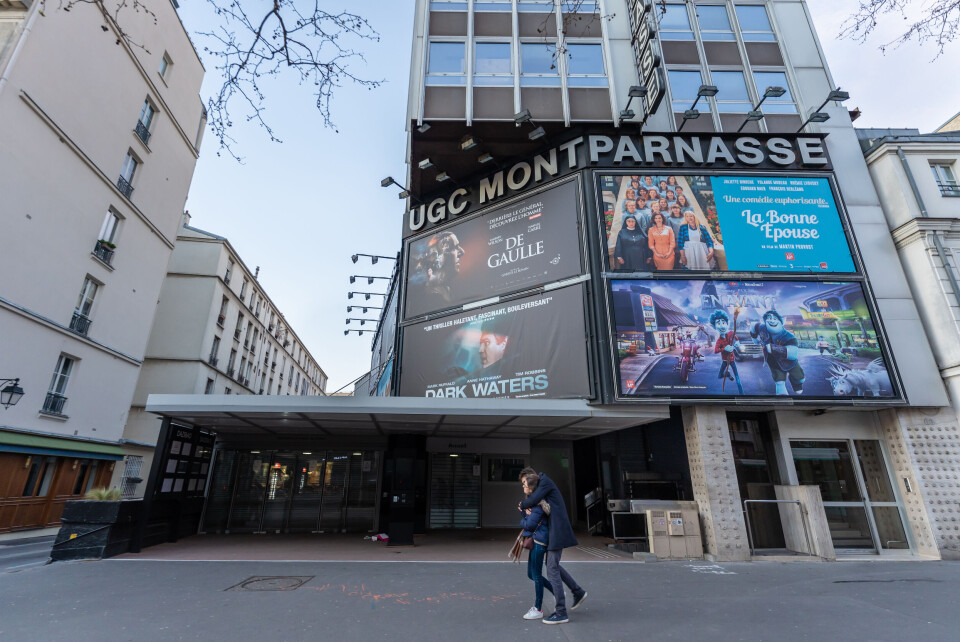-
Six good news stories from France in 2025
From revolutionary eye surgery and sporting successes, to successful fundraising for iconic French brands, the year was full of feel-good news
-
Why is New Year's Eve known as Réveillon de la Saint-Sylvestre in France?
You may have heard French friends use this term but they might not know where it comes from
-
French farmer protests: union calls for ‘mass restart’ of action
January 7 is highlighted as day for key action - other unions are yet to commit
39% of people polled shun culture events in France despite health pass
Over half of respondents to a survey said the reason they have not returned to cinemas, museums and other cultural places is fear of catching Covid. One quarter said they did not have a health pass and would not get one to go

A study has found that 39% of French people who pre-Covid usually go to public cultural events or places have not returned to one despite the launch of the health pass on July 21.
The survey, commissioned by France’s ministry of culture, asked 3,025 adults about how the pandemic had impacted their cultural habits and found that of the 88% of respondents who usually go to cultural events or places in a year, 61% have been to one since July 21.
The survey, carried out by market research agency Harris Interactive between August 31 and September 3, also found that 30% of people said that they planned to go out less often in the coming months.
The main reason cited was concern over Covid, with over half of respondents (54%) saying they were scared of catching or spreading it at busy places.
One quarter said they did not have a health pass and did not want to get one to go to a cultural space (cinema, theatre, museum, concert, etc.).
France’s health pass (pass sanitaire) was introduced gradually, beginning on July 21 when it was required to enter events gathering 50 people or more. It was extended on August 9 when it became necessary for adults to show one to enter the majority of public places, regardless of capacity. On September 30 this was extended to children aged 12 to 17.
A health pass is proof of being fully vaccinated against Covid, having a negative Covid test (PCR or antigen) no more than 72 hours old, or having proof of having had Covid in the past six months.
Hélène Herschel, general delegate of la Fédération nationale des Éditeurs de Films, said that the health pass has “created a terrible shock and a very strong drop in cinema attendance”.
“It's a drop that hasn't stopped since the pass was introduced, and we're now at around 20 to 25% down compared to the average of previous years,” she told BFMTV.
Of the 76% of respondents to the ministry of culture’s survey who usually go to the cinema in a normal year, only 51% have returned at least once since July 21.
The 25% of people discouraged by the health pass is still less than several other factors respondents cited, including 35% of people who said that because of working from home they have less opportunity to go to cultural places, and 32% who said that less money had limited their possibilities of going.
Since the introduction of the health pass, the number of people choosing to be vaccinated has increased dramatically. Over 1.5 million first vaccination appointments alone were booked in the week following President Emmanuel Macron’s announcement of the health pass measures, on July 12.
Its success has also led to other countries looking into or adopting similar measures. Belgium brought in a mandatory health pass for certain public places in the capital city of Brussels in mid-October, and to the southern region of Wallonia yesterday (November 1).
Read more:France health pass: 'Success leads dozens of countries to do same'
What effect will the pandemic have on the future of culture?
The survey also asked people about their expectations once the pandemic is over.
62% of respondents said they did not expect to go more or less often to cultural places after the pandemic.
However, 11% said they planned to go less often, which the ministry of culture described as both worrying and also an opinion “very much in the minority”.
For the other respondents, 16% said they planned to go more often once the pandemic was over, and 11% said they did not know.
The Ministry of Culture stated that the survey was just a first insight into the cultural tendencies of people in France.
“Although it is premature to draw definitive conclusions from this survey, the Ministry of Culture will continue to monitor these developments and the trends that emerge from them very closely, in order to determine what is strictly cyclical and what reveals structural changes in French cultural practices,” it wrote in a press release.
Related stories:
Musicians in France angry at SNCF rail fines for big instruments
Key points of Macron’s multi-billion euro investment plan for France
'Why we were protesting against the French health pass today'
























